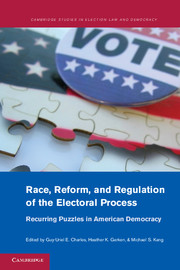Book contents
- Frontmatter
- Contents
- Figures
- Tables
- Contributors
- Preface
- Introduction: The Future of Elections Scholarship
- PART I RACE AND POLITICS
- Overview: How, If at All, Is Racial and Ethnic Stratification Changing, and What Should We Do about It?
- 1 Voting Rights
- 2 The Reconstruction of Voting Rights
- 3 Explaining Perceptions of Competitive Threat in a Multiracial Context
- PART II COURTS AND THE REGULATION OF THE ELECTORAL PROCESS
- PART III ELECTION PERFORMANCE AND REFORM
- PART IV CONCLUSION
- Index
- References
Overview: How, If at All, Is Racial and Ethnic Stratification Changing, and What Should We Do about It?
Published online by Cambridge University Press: 01 June 2011
- Frontmatter
- Contents
- Figures
- Tables
- Contributors
- Preface
- Introduction: The Future of Elections Scholarship
- PART I RACE AND POLITICS
- Overview: How, If at All, Is Racial and Ethnic Stratification Changing, and What Should We Do about It?
- 1 Voting Rights
- 2 The Reconstruction of Voting Rights
- 3 Explaining Perceptions of Competitive Threat in a Multiracial Context
- PART II COURTS AND THE REGULATION OF THE ELECTORAL PROCESS
- PART III ELECTION PERFORMANCE AND REFORM
- PART IV CONCLUSION
- Index
- References
Summary
These chapters on the politics of groups push the reader to consider a difficult but essential question: How, if at all, are old forms of racial and ethnic stratification changing? A broadly persuasive answer would have powerful implications ranging from constitutional design and electoral strategies to interpersonal relationships and private emotions. However, the question is not only difficult to answer for obvious empirical reasons, but also because, for scholars just as for the general public, one's own views inevitably shape what one considers to be legitimate evidence and appropriate evaluation of it. So the study of racial dynamics is exasperatingly circular, even with the best research and most impressive researchers.
Although my concerns about circularity lead me to raise questions about all three chapters, I want to begin by pointing out their quality. Each provides the reader with a clear thesis, well defended by relevant evidence and attentive to alternative arguments or weaknesses in the preferred one. Each chapter grows out of a commitment to the best values of liberal democracy – individual freedom and dignity, along with collective control by the citizenry over their governors – but commitments do not override careful analysis. Each chapter is a pleasure to read and teaches us something new and important.
My observations begin with a direct comparison of Pildes's and Karlan's respective evaluations of the United States' Voting Rights Act and its appropriate reforms.
- Type
- Chapter
- Information
- Race, Reform, and Regulation of the Electoral ProcessRecurring Puzzles in American Democracy, pp. 7 - 16Publisher: Cambridge University PressPrint publication year: 2011



